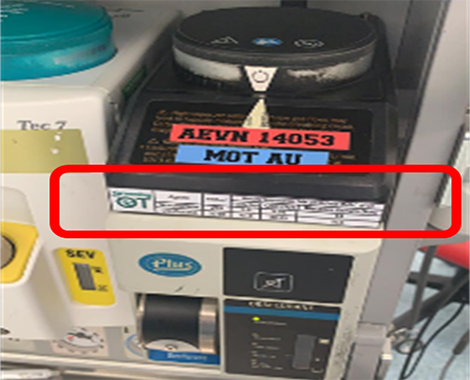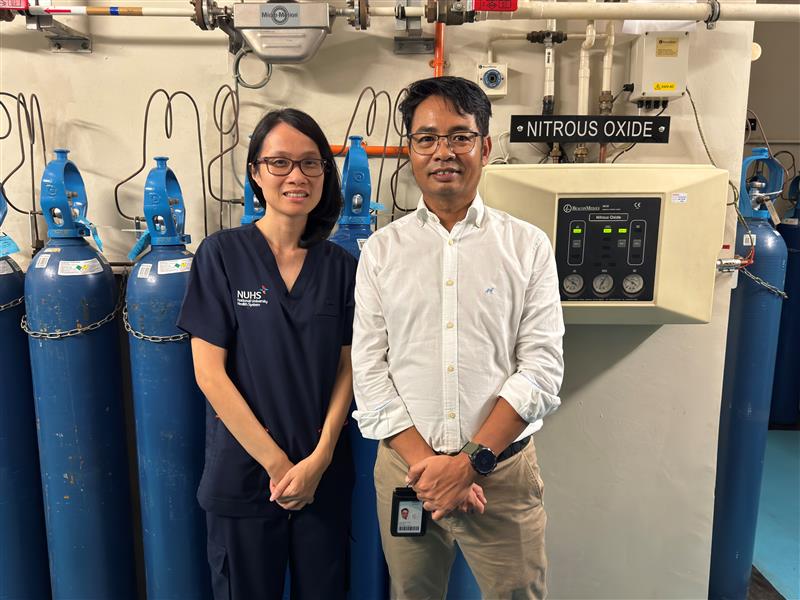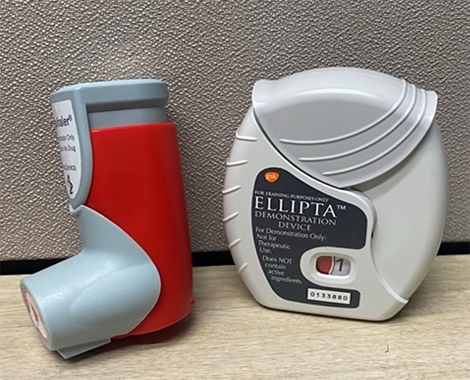Appropriate Care
Research suggests that up to 20% of global healthcare is low-value and unnecessary. This strains resources and potentially harms patients. NUHS' 'Appropriate Care' programme, guided by "Choose Wisely" recommendations, aims to reduce such unnecessary treatments and develop low-carbon care pathways. This approach aligns manpower, financial, and environmental sustainability by cutting waste and using resources more efficiently.
Reducing the use of high carbon drugs

Staff education: Sticker on the vaporiser communicates the carbon impact in kilometres driven.
Stop the use of desflurane
Per hour of use, the inhaled anesthetic gas desflurane has a much higher carbon footprint compared to other anaesthetic drugs that have similar efficacy. Through a combination of staff education and practice change, NUH and AH have successfully reduced their use of desflurane by over 97% and 100% respectively.
* Ang, K. S., BMJ Open Quality, 2023

Project leads Dr Ang King Sin (left), Consultant, NUH Dept of Anaesthesia and Nay Myo Htet, Snr Engineer, NUH OSS-GFM
Shut down nitrous oxide pipeline systems
The anaesthetic gas nitrous oxide (N2O) is a greenhouse gas with a global warming potential 298 times that of carbon dioxide (CO2). Studies show that 75-90% of N2O is lost through pipeline leakages and never reaches patients. NUHS is working to reduce N2O emissions by shutting down pipeline supply systems where possible. Residual needs are met with small pin indexed cylinders. Nitrous oxide pipelines will not be built in redeveloped and new hospital buildings.
*Lum, B.X., Can J Anaesth, 2023
 MDIs (left) contain a hydrofluoroalkane (HFA) propellant which contributes significantly to global warming.
MDIs (left) contain a hydrofluoroalkane (HFA) propellant which contributes significantly to global warming.
Reduce use of metered dose inhalers (MDIs)
Metered dose inhalers (MDIs) are used for the treatment of asthma and other respiratory conditions. They have a much higher carbon footprint than dry powder inhalers (DPIs) due to the propellants in them. DPIs are a more environmentally friendly method of drug delivery. NUH has begun to reduce MDI use through clinician education to decrease MDI prescriptions and promote DPIs when clinically appropriate. Patients are also taught how to effectively use DPIs and guided to change to DPIs where clinically appropriate.
Back to 'NUHS Sustainability' >



 MDIs (left) contain a hydrofluoroalkane (HFA) propellant which contributes significantly to global warming.
MDIs (left) contain a hydrofluoroalkane (HFA) propellant which contributes significantly to global warming. 















